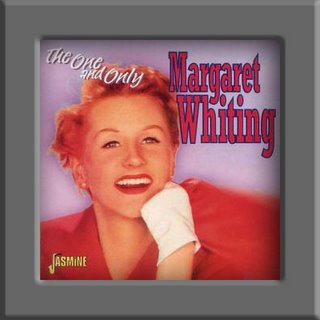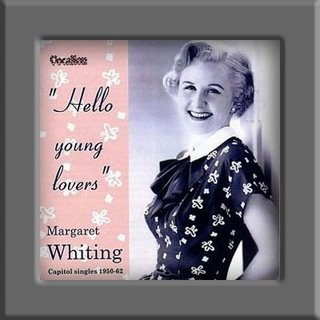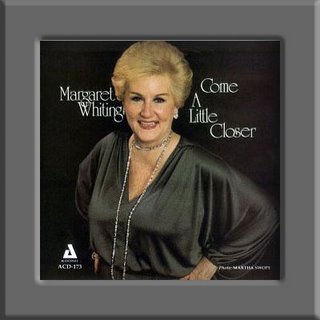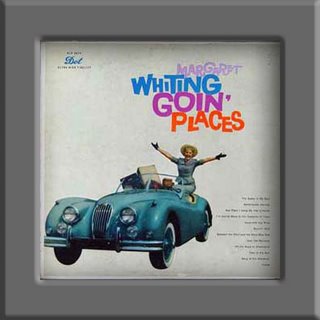WHITING Margaret 1960
Margaret Whiting was a dominant pop singer in the '40s and '50s, though whether she's a jazz vocalist is often in question. She had a clear, striking voice and the kind of quasi-innocent sensibility that worked on such songs as "It Might As Well Be Spring". Some would question if she was an improviser, or had the kind of timing, sense of swing, and fluidity that defines the genuine jazz or jazz-influenced singer. Whiting's run of hits began in the early '40s when she was featured on radio shows, singing with composer/vocalist Johnny Mercer. She was later a prominent vocalist with the bands of Freddie Slack, Billy Butterfield, and Paul Weston. She had three huge hits in 1948 with "Now Is the Hour", "A Tree in the Meadow", and "Far Away Places" then teamed with Jimmy Wakely for another top hit in 1949 "Slippin' Around." She and Wakely were a very successful team for a time. Whiting had a comeback of sorts in the early '70s, appearing on a Cavalcade of Bands tour with the groups of Bob Crosby and others.
She was movie dubber in Youth on Parade (Republic, 1942) for Martha O’Driscoll & in Valley of the Dolls (Fox, 1967) for Susan Hayward .
Interview with Margaret Whiting by Jonathan Frank in 2004 for "Cabaret"
Last month she was honored as the recipient of the Nightlife Award Hall of Fame, and this month she will be performing a special Valentine's Day Weekend concert at the 92nd Street Y in New York.
JF: You were blessed with the singer's dream childhood, as you were exposed not only to the music of your father, Richard Whiting [whose songs include "Too Marvelous for Words," "Ain't We Got Fun," and "On the Good Ship Lollipop"], but to the people he worked with as well.
MW: I can't think of any other singer who grew up in a household where you would go into your father's studio and have someone like Arthur Schwartz working there. Imagine growing up and hearing Harold Arlen playing piano and singing his songs. Johnny Mercer was my father's best friend and became mine as well. And Harold Arlen, whom I would call Uncle Harry, and Harry Warren: those were ones who I really became close to.
JF: I would imagine that growing up around all of those songwriters would influence you as a singer.
MW: It gave me some incredible opportunities. My best girlfriend in school was Harry Warren's daughter, Cookie, and I would often spend the weekend there. One night, Harry Warren told me that Glenn Miller was going to come to hear a song that Harry had written for him for a new picture. Cookie told me that she had a date for me that night so we all could go out, but I told her I was staying right at her house to meet Glenn Miller. I sat at the bar ... Harry was wonderful about it. He introduced me as Dick Whiting's daughter and told Glenn that I was going to be a singer and wanted to meet him and hear the song.
So Harry sat at the piano and Glenn ended up picking up his trumpet and playing along to the song, which was "Chattanooga Choo Choo!" I got to be one of the first people to hear it! So that's really what was wonderful for me growing up, since I got to know so many of the songwriters who liked me and thought I had talent. They would then tell me how to read a lyric and sing a song, and challenge me to try and find a different end to a song.
JF: What was the best piece of advice that Johnny Mercer ever gave you?
MW: He heard me sing at the house one night and said that he had two words of advice for me: "Grow up!" That was it. He meant that I wasn't ready yet. I had years of experience that I still needed to accumulate and go through. He would come over for a visit, sit me down and have me read the lyric to a song as if it were a poem, which is the way I teach people to sing as well. I have them talk the lyric out until it sounds like something they really believe, like an actor with a monologue.
JF: And what other lessons did you learn from the various musicians and composers?
MW: Well, the musicians recommend that I sing a sing the way it is written the first time and then start to look for other notes that aren't in the melody.
JF: You certainly learned all of your lessons well, as you are regarded as one of the best phrasers of a lyric and have been since day one, even when you were singing with orchestras.
MW: I never really was a band singer, though. I worked mainly with studio musicians, and not true 'bands.' I only sang with one band, and that was when I sang "That Old Black Magic." Not that it would have been a bad thing ... I missed out on the years of experience I would have received by singing the same songs over and over and getting better.
I did tour with Bob Hope and Les Brown and his band for seven years and it was wonderful. The guys were so great in the band. A funny thing happened recently, in fact. The pianist in Les Brown's band was a man named Geoff Clarkson. He was a great friend of mine and played beautifully. A few years ago he sent me a song that he had written that Johnny Mercer had heard and had written lyrics for. I had never heard it! Jeff gave it to me and I looked it over and sent it to Tony Bennett and I think he's going to record it. It's called "Time to Smile." It was to have been the theme for something and Johnny heard it and thought it would be a great song.
JF: What is it about Johnny Mercer that makes him resonate so readily with singers of any generation?
MW: I think people realize that Johnny's lyrics contain the greatest level of simplicity and warmth. I often look at lyrics of his and think, "Oh! Now I finally know what he meant!" It's amazing. He had such warmth and a sense of honesty when he wrote lyrics and there was nobody else like him ... except perhaps Larry Hart.
JF: You were in Dream on Broadway, which was a musical devoted to songs by Johnny Mercer. I was surprised to find out that Dream was your only Broadway show.
MW: That's true, although I've done a lot of Off-Broadway, and shows all over the country. I have been in Gypsy a lot and was all the place with that.
JF: I know you toured a lot with 4 Girls 4. When did you do that?
MW: We started in the '70s and went through into the '80s. The show featured four women who had been big stars in the music and entertainment business. I did it mainly with Rosemary Clooney, Helen O'Connell, and Rose Marie, although we also had Kay Star and a couple of other people over the years. We used to toss for who got to open the show. After a while, though, we settled on having me go first. Helen, who was a different kind of singer, would go second and I would introduce her. Then there would be an intermission. Then Rose Marie, who was the comedienne, would open the second act. She would then introduce Rosemary Clooney. When Rosemary was done, I would come back, talk to Rosemary for a minute and everybody else came on the stage to do a group number called "4 Girls 4" that was written by Johnny Myer.
JF: I just talked to him in December; I sang one of his songs at a benefit: "After The Holidays."
MW: Oh, that's a beautiful song. He's a wonderful guy.
JF: One of the wonderful things about you is how much you have given back to the musical community. You started The Eugene O'Neill Cabaret Symposium ...
MW: Yes, in the '90s, and I did it for 13 years. But now it's been disbanded and the alumni are teaching all over the country instead.
JF: You also are the president of the Johnny Mercer Foundation. Did you start that as well?
MW: No, his wife, Ginger, did. It's grown and grown and we've done a lot of wonderful things. My husband, Jack Wrangler, and I have been going to Sundance where we've been involved in a different kind of program. We work with singers, writers and directors up there and talk about the importance of the Great American Songbook and why it should be included in today's films. We also have put together a new ballet for the Dancers of Harlem called St. Louis Woman: A Blues Ballet, which is based on the musical St. Louis Woman and its incredible score by Johnny Mercer and Harold Arlen. It opened in New York and has been performed down south, in Hollywood and all over the country.
JF: One of the best aspects of The Johnny Mercer Foundation, in my opinion, is the "Accentuate The Positive" program, which introduces elementary students to the Great American Songbook.
MW: That's right. We teach young kids from eight to fourteen or fifteen about their musical heritage through great songs written by American songwriters. We don't do too many modern composers, although we include songs from Billy Joel and other writers like him. We try to acquaint them with Irving Berlin and George Gershwin. While they might know "God Bless America," due to its popularity after 9/11, they don't know any of Berlin's other songs. It's even more important to be doing this now that so many schools have cut the music classes out of their curriculum. We're trying to fill that gap by teaching the teachers how to educate the kids about their musical heritage.
JF: You also do your part in acknowledging and nurturing current songwriters through the Johnny Mercer Foundation Songwriter Award.
MW: Yes. We've had some wonderful winners: John Bucchino, Ann Hampton Callaway, Craig Carnelia, Carol Hall, Amanda McBroom, Steven Lutvak ... they really are incredible writers and we awarded them the Johnny Mercer Foundation Songwriter Award, which includes a cash prize, to help them out.
JF: The Johnny Mercer Foundation also had something to do with the development of The Light in the Piazza by Adam Guettel and Craig Lucas.
MW: The show was part of the Sundance Theatre Lab, which the Johnny Mercer Foundation has been funding. It gives writers the chance to work on their shows and present them to theaters for further development and production. Seattle [Intiman Theatre] and Chicago [Goodman Theatre] came and decided to put it on, and it has gotten wonderful reviews.
JF: Do you have any shows on the horizon?
MW: I'm going to be at the 92nd Street Y on the 14th, 15th and 16th of February with Mary Cleere Haran as part of their Lyrics and Lyricist series. We're doing a show called Harry Warren: There Will be Another You and I'll be performing songs Harry Warren wrote with Johnny Mercer from The Harvey Girls. [for more information visit The 92nd Street Y]
I'll also be performing in Washington DC in May, where I'll be singing and telling stories about singing during the War. I think it's at the Smithsonian.
JF: Sounds like you are keeping busy. Have a wonderful Valentine's Day!
MW: Thank you!
She was movie dubber in Youth on Parade (Republic, 1942) for Martha O’Driscoll & in Valley of the Dolls (Fox, 1967) for Susan Hayward .
Interview with Margaret Whiting by Jonathan Frank in 2004 for "Cabaret"
Last month she was honored as the recipient of the Nightlife Award Hall of Fame, and this month she will be performing a special Valentine's Day Weekend concert at the 92nd Street Y in New York.
JF: You were blessed with the singer's dream childhood, as you were exposed not only to the music of your father, Richard Whiting [whose songs include "Too Marvelous for Words," "Ain't We Got Fun," and "On the Good Ship Lollipop"], but to the people he worked with as well.
MW: I can't think of any other singer who grew up in a household where you would go into your father's studio and have someone like Arthur Schwartz working there. Imagine growing up and hearing Harold Arlen playing piano and singing his songs. Johnny Mercer was my father's best friend and became mine as well. And Harold Arlen, whom I would call Uncle Harry, and Harry Warren: those were ones who I really became close to.
JF: I would imagine that growing up around all of those songwriters would influence you as a singer.
MW: It gave me some incredible opportunities. My best girlfriend in school was Harry Warren's daughter, Cookie, and I would often spend the weekend there. One night, Harry Warren told me that Glenn Miller was going to come to hear a song that Harry had written for him for a new picture. Cookie told me that she had a date for me that night so we all could go out, but I told her I was staying right at her house to meet Glenn Miller. I sat at the bar ... Harry was wonderful about it. He introduced me as Dick Whiting's daughter and told Glenn that I was going to be a singer and wanted to meet him and hear the song.
So Harry sat at the piano and Glenn ended up picking up his trumpet and playing along to the song, which was "Chattanooga Choo Choo!" I got to be one of the first people to hear it! So that's really what was wonderful for me growing up, since I got to know so many of the songwriters who liked me and thought I had talent. They would then tell me how to read a lyric and sing a song, and challenge me to try and find a different end to a song.
JF: What was the best piece of advice that Johnny Mercer ever gave you?
MW: He heard me sing at the house one night and said that he had two words of advice for me: "Grow up!" That was it. He meant that I wasn't ready yet. I had years of experience that I still needed to accumulate and go through. He would come over for a visit, sit me down and have me read the lyric to a song as if it were a poem, which is the way I teach people to sing as well. I have them talk the lyric out until it sounds like something they really believe, like an actor with a monologue.
JF: And what other lessons did you learn from the various musicians and composers?
MW: Well, the musicians recommend that I sing a sing the way it is written the first time and then start to look for other notes that aren't in the melody.
JF: You certainly learned all of your lessons well, as you are regarded as one of the best phrasers of a lyric and have been since day one, even when you were singing with orchestras.
MW: I never really was a band singer, though. I worked mainly with studio musicians, and not true 'bands.' I only sang with one band, and that was when I sang "That Old Black Magic." Not that it would have been a bad thing ... I missed out on the years of experience I would have received by singing the same songs over and over and getting better.
I did tour with Bob Hope and Les Brown and his band for seven years and it was wonderful. The guys were so great in the band. A funny thing happened recently, in fact. The pianist in Les Brown's band was a man named Geoff Clarkson. He was a great friend of mine and played beautifully. A few years ago he sent me a song that he had written that Johnny Mercer had heard and had written lyrics for. I had never heard it! Jeff gave it to me and I looked it over and sent it to Tony Bennett and I think he's going to record it. It's called "Time to Smile." It was to have been the theme for something and Johnny heard it and thought it would be a great song.
JF: What is it about Johnny Mercer that makes him resonate so readily with singers of any generation?
MW: I think people realize that Johnny's lyrics contain the greatest level of simplicity and warmth. I often look at lyrics of his and think, "Oh! Now I finally know what he meant!" It's amazing. He had such warmth and a sense of honesty when he wrote lyrics and there was nobody else like him ... except perhaps Larry Hart.
JF: You were in Dream on Broadway, which was a musical devoted to songs by Johnny Mercer. I was surprised to find out that Dream was your only Broadway show.
MW: That's true, although I've done a lot of Off-Broadway, and shows all over the country. I have been in Gypsy a lot and was all the place with that.
JF: I know you toured a lot with 4 Girls 4. When did you do that?
MW: We started in the '70s and went through into the '80s. The show featured four women who had been big stars in the music and entertainment business. I did it mainly with Rosemary Clooney, Helen O'Connell, and Rose Marie, although we also had Kay Star and a couple of other people over the years. We used to toss for who got to open the show. After a while, though, we settled on having me go first. Helen, who was a different kind of singer, would go second and I would introduce her. Then there would be an intermission. Then Rose Marie, who was the comedienne, would open the second act. She would then introduce Rosemary Clooney. When Rosemary was done, I would come back, talk to Rosemary for a minute and everybody else came on the stage to do a group number called "4 Girls 4" that was written by Johnny Myer.
JF: I just talked to him in December; I sang one of his songs at a benefit: "After The Holidays."
MW: Oh, that's a beautiful song. He's a wonderful guy.
JF: One of the wonderful things about you is how much you have given back to the musical community. You started The Eugene O'Neill Cabaret Symposium ...
MW: Yes, in the '90s, and I did it for 13 years. But now it's been disbanded and the alumni are teaching all over the country instead.
JF: You also are the president of the Johnny Mercer Foundation. Did you start that as well?
MW: No, his wife, Ginger, did. It's grown and grown and we've done a lot of wonderful things. My husband, Jack Wrangler, and I have been going to Sundance where we've been involved in a different kind of program. We work with singers, writers and directors up there and talk about the importance of the Great American Songbook and why it should be included in today's films. We also have put together a new ballet for the Dancers of Harlem called St. Louis Woman: A Blues Ballet, which is based on the musical St. Louis Woman and its incredible score by Johnny Mercer and Harold Arlen. It opened in New York and has been performed down south, in Hollywood and all over the country.
JF: One of the best aspects of The Johnny Mercer Foundation, in my opinion, is the "Accentuate The Positive" program, which introduces elementary students to the Great American Songbook.
MW: That's right. We teach young kids from eight to fourteen or fifteen about their musical heritage through great songs written by American songwriters. We don't do too many modern composers, although we include songs from Billy Joel and other writers like him. We try to acquaint them with Irving Berlin and George Gershwin. While they might know "God Bless America," due to its popularity after 9/11, they don't know any of Berlin's other songs. It's even more important to be doing this now that so many schools have cut the music classes out of their curriculum. We're trying to fill that gap by teaching the teachers how to educate the kids about their musical heritage.
JF: You also do your part in acknowledging and nurturing current songwriters through the Johnny Mercer Foundation Songwriter Award.
MW: Yes. We've had some wonderful winners: John Bucchino, Ann Hampton Callaway, Craig Carnelia, Carol Hall, Amanda McBroom, Steven Lutvak ... they really are incredible writers and we awarded them the Johnny Mercer Foundation Songwriter Award, which includes a cash prize, to help them out.
JF: The Johnny Mercer Foundation also had something to do with the development of The Light in the Piazza by Adam Guettel and Craig Lucas.
MW: The show was part of the Sundance Theatre Lab, which the Johnny Mercer Foundation has been funding. It gives writers the chance to work on their shows and present them to theaters for further development and production. Seattle [Intiman Theatre] and Chicago [Goodman Theatre] came and decided to put it on, and it has gotten wonderful reviews.
JF: Do you have any shows on the horizon?
MW: I'm going to be at the 92nd Street Y on the 14th, 15th and 16th of February with Mary Cleere Haran as part of their Lyrics and Lyricist series. We're doing a show called Harry Warren: There Will be Another You and I'll be performing songs Harry Warren wrote with Johnny Mercer from The Harvey Girls. [for more information visit The 92nd Street Y]
I'll also be performing in Washington DC in May, where I'll be singing and telling stories about singing during the War. I think it's at the Smithsonian.
JF: Sounds like you are keeping busy. Have a wonderful Valentine's Day!
MW: Thank you!
SINGS THE JEROME KERN SONG BOOK 2xLP 1960
LP 1 (12 tracks) LP 2 (12 tracks)








1 comment:
Margaret Whiting has always been a favorite of mine. I've always found her style technically pristine and warm. Do yourself a favor and give this classic double album a listen.
Thanks Daniel !
ken
Post a Comment